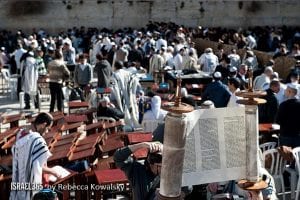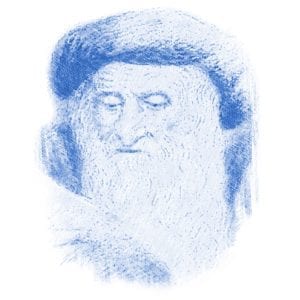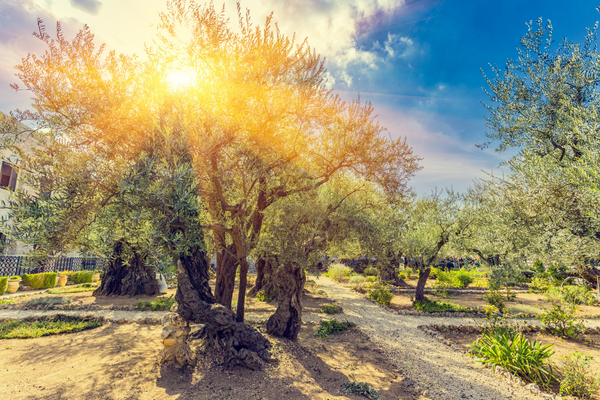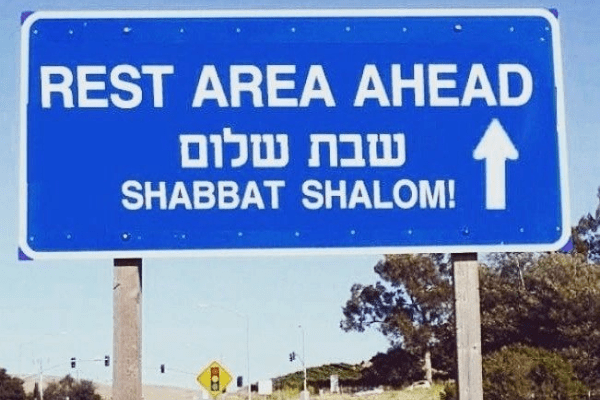
TORAH
NEVI'IM
KETUVIM
Chapter 2
Translation and Transliteration of
Listen to this chapter in Hebrew:
- Commentary
- Buy E-book
- Buy the Israel Bible
1The heaven and the earth were finished, and all their array.
אוַיְכֻלּוּ הַשָּׁמַיִם וְהָאָרֶץ וְכָל־צְבָאָם׃
2On the seventh day Hashem finished the work that He had been doing, and He ceased on the seventh day from all the work that He had done.
בוַיְכַל אֱלֹהִים בַּיּוֹם הַשְּׁבִיעִי מְלַאכְתּוֹ אֲשֶׁר עָשָׂה וַיִּשְׁבֹּת בַּיּוֹם הַשְּׁבִיעִי מִכָּל־מְלַאכְתּוֹ אֲשֶׁר עָשָׂה׃
3And Hashem blessed the seventh day and declared it holy, because on it Hashem ceased from all the work of creation that He had done.
גוַיְבָרֶךְ אֱלֹהִים אֶת־יוֹם הַשְּׁבִיעִי וַיְקַדֵּשׁ אֹתוֹ כִּי בוֹ שָׁבַת מִכָּל־מְלַאכְתּוֹ אֲשֶׁר־בָּרָא אֱלֹהִים לַעֲשׂוֹת׃

Torah reading at the Western Wall
![]() 2:3 Because on it Hashem ceased from all the work of creation that He had done.
2:3 Because on it Hashem ceased from all the work of creation that He had done.
On the seventh day of creation, Hashem (God) ceased the creative process and rested. The seventh day of every week is called Shabbat. On this days, Jews emulate Hashem by ceasing to use creative powers and instead rest. By observing Shabbat, Jews affirm their belief in Hashem as the Creator of the universe who is responsible for all that happens in the world. The Land of Israel also has a Shabbat of its own, once every seven years. By abandoning the fields of Israel once every seven years, allowing them to rest, and putting our sustenance in the hands of Hashem, we affirm our belief that He is intimately involved in everything that happens in our lives. We owe all of our successes to Hashem, and we believe that He will provide for us, even during the Sabbatical year when we are not working the land. On Shabbat, it is customary for Jews to greet each other with the phrase Shabbat Shalom (Have a peaceful Sabbath). Wishing all of our readers a Shabbat Shalom!
4Such is the story of heaven and earth when they were created. When Hashem made earth and heaven—
דאֵלֶּה תוֹלְדוֹת הַשָּׁמַיִם וְהָאָרֶץ בְּהִבָּרְאָם בְּיוֹם עֲשׂוֹת יְהֹוָה אֱלֹהִים אֶרֶץ וְשָׁמָיִם׃
5when no shrub of the field was yet on earth and no grasses of the field had yet sprouted, because Hashem had not sent rain upon the earth and there was no man to till the soil,
v'-KHOL SEE-akh ha-sa-DEH TE-rem yih-YEH va-A-retz v'-khol AY-sev ha-sa-DEH TE-rem yitz-MAKH KEE LO him-TEER a-do-NAI e-lo-HEEM al ha-A-retz v'-a-DAM A-yin la-a-VOD et ha-a-da-MAH
הוְכֹל שִׂיחַ הַשָּׂדֶה טֶרֶם יִהְיֶה בָאָרֶץ וְכָל־עֵשֶׂב הַשָּׂדֶה טֶרֶם יִצְמָח כִּי לֹא הִמְטִיר יְהֹוָה אֱלֹהִים עַל־הָאָרֶץ וְאָדָם אַיִן לַעֲבֹד אֶת־הָאֲדָמָה׃
![]() 2:5 Because Hashem had not sent rain upon the earth
2:5 Because Hashem had not sent rain upon the earth
The land was poised to allow its seeds to sprout, but God did not bring forth rain to allow them to grow, because there was no man yet to work the land. Hashem did not bring rain until there was a person who could recognize the necessity for rain, and, says Rashi, pray for rain. During its short rainy season, Eretz Yisrael is dependent on adequate rainfall to produce yearly crops. It is God’s design that the Jews living in Israel are to strengthen their relationship with Him through daily prayer requesting adequate rainfall and a successful agricultural season. Since Hashem desires a deep relationship with man, He incorporated the need for prayer, the ultimate form of dialogue between man and God, within the natural order.

Rashi (1040-1105)

Morning dew near Beit Shemesh
6but a flow would well up from the ground and water the whole surface of the earth—
ווְאֵד יַעֲלֶה מִן־הָאָרֶץ וְהִשְׁקָה אֶת־כָּל־פְּנֵי־הָאֲדָמָה׃
7Hashem formed man from the dust of the earth. He blew into his nostrils the breath of life, and man became a living being.
זוַיִּיצֶר יְהֹוָה אֱלֹהִים אֶת־הָאָדָם עָפָר מִן־הָאֲדָמָה וַיִּפַּח בְּאַפָּיו נִשְׁמַת חַיִּים וַיְהִי הָאָדָם לְנֶפֶשׁ חַיָּה׃
8Hashem planted a garden in Eden, in the east, and placed there the man whom He had formed.
חוַיִּטַּע יְהֹוָה אֱלֹהִים גַּן־בְעֵדֶן מִקֶּדֶם וַיָּשֶׂם שָׁם אֶת־הָאָדָם אֲשֶׁר יָצָר׃
9And from the ground Hashem caused to grow every tree that was pleasing to the sight and good for food, with the tree of life in the middle of the garden, and the tree of knowledge of good and bad.
טוַיַּצְמַח יְהֹוָה אֱלֹהִים מִן־הָאֲדָמָה כָּל־עֵץ נֶחְמָד לְמַרְאֶה וְטוֹב לְמַאֲכָל וְעֵץ הַחַיִּים בְּתוֹךְ הַגָּן וְעֵץ הַדַּעַת טוֹב וָרָע׃
10A river issues from Eden to water the garden, and it then divides and becomes four branches.
יוְנָהָרּ יֹצֵא מֵעֵדֶן לְהַשְׁקוֹת אֶת־הַגָּן וּמִשָּׁם יִפָּרֵד וְהָיָה לְאַרְבָּעָה רָאשִׁים׃
11The name of the first is Pishon, the one that winds through the whole land of Havilah, where the gold is.
יאשֵׁם הָאֶחָד פִּישׁוֹן הוּא הַסֹּבֵב אֵת כָּל־אֶרֶץ הַחֲוִילָה אֲשֶׁר־שָׁם הַזָּהָב׃
12The gold of that land is good; bdellium is there, and lapis lazuli.)
יבוּזֲהַב הָאָרֶץ הַהִוא טוֹב שָׁם הַבְּדֹלַח וְאֶבֶן הַשֹּׁהַם׃
13The name of the second river is Gichon, the one that winds through the whole land of Cush.
יגוְשֵׁם־הַנָּהָר הַשֵּׁנִי גִּיחוֹן הוּא הַסּוֹבֵב אֵת כָּל־אֶרֶץ כּוּשׁ׃
14The name of the third river is Tigris, the one that flows east of Assyria. And the fourth river is the Euphrates.
ידוְשֵׁם הַנָּהָר הַשְּׁלִישִׁי חִדֶּקֶל הוּא הַהֹלֵךְ קִדְמַת אַשּׁוּר וְהַנָּהָר הָרְבִיעִי הוּא פְרָת׃
15Hashem took the man and placed him in the garden of Eden, to till it and tend it.
טווַיִּקַּח יְהֹוָה אֱלֹהִים אֶת־הָאָדָם וַיַּנִּחֵהוּ בְגַן־עֵדֶן לְעָבְדָהּ וּלְשָׁמְרָהּ׃
16And Hashem commanded the man, saying, “Of every tree of the garden you are free to eat;
טזוַיְצַו יְהֹוָה אֱלֹהִים עַל־הָאָדָם לֵאמֹר מִכֹּל עֵץ־הַגָּן אָכֹל תֹּאכֵל׃
17but as for the tree of knowledge of good and bad, you must not eat of it; for as soon as you eat of it, you shall die.”
יזוּמֵעֵץ הַדַּעַת טוֹב וָרָע לֹא תֹאכַל מִמֶּנּוּ כִּי בְּיוֹם אֲכָלְךָ מִמֶּנּוּ מוֹת תָּמוּת׃
18Hashem said, “It is not good for man to be alone; I will make a fitting helper for him.”
יחוַיֹּאמֶר יְהֹוָה אֱלֹהִים לֹא־טוֹב הֱיוֹת הָאָדָם לְבַדּוֹ אֶעֱשֶׂהּ־לּוֹ עֵזֶר כְּנֶגְדּוֹ׃
19And Hashem formed out of the earth all the wild beasts and all the birds of the sky, and brought them to the man to see what he would call them; and whatever the man called each living creature, that would be its name.
יטוַיִּצֶר יְהֹוָה אֱלֹהִים מִן־הָאֲדָמָה כָּל־חַיַּת הַשָּׂדֶה וְאֵת כָּל־עוֹף הַשָּׁמַיִם וַיָּבֵא אֶל־הָאָדָם לִרְאוֹת מַה־יִּקְרָא־לוֹ וְכֹל אֲשֶׁר יִקְרָא־לוֹ הָאָדָם נֶפֶשׁ חַיָּה הוּא שְׁמוֹ׃
20And the man gave names to all the cattle and to the birds of the sky and to all the wild beasts; but for Adam no fitting helper was found.
כוַיִּקְרָא הָאָדָם שֵׁמוֹת לְכָל־הַבְּהֵמָה וּלְעוֹף הַשָּׁמַיִם וּלְכֹל חַיַּת הַשָּׂדֶה וּלְאָדָם לֹא־מָצָא עֵזֶר כְּנֶגְדּוֹ׃
21So Hashem cast a deep sleep upon the man; and, while he slept, He took one of his ribs and closed up the flesh at that spot.
כאוַיַּפֵּל יְהֹוָה אֱלֹהִים תַּרְדֵּמָה עַל־הָאָדָם וַיִּישָׁן וַיִּקַּח אַחַת מִצַּלְעֹתָיו וַיִּסְגֹּר בָּשָׂר תַּחְתֶּנָּה׃
22And Hashem fashioned the rib that He had taken from the man into a woman; and He her to the man.
כבוַיִּבֶן יְהֹוָה אֱלֹהִים אֶת־הַצֵּלָע אֲשֶׁר־לָקַח מִן־הָאָדָם לְאִשָּׁה וַיְבִאֶהָ אֶל־הָאָדָם׃
23Then the man said, “This one at last Is bone of my bones And flesh of my flesh. This one shall be called Woman, For from man was she taken.”
כגוַיֹּאמֶר הָאָדָם זֹאת הַפַּעַם עֶצֶם מֵעֲצָמַי וּבָשָׂר מִבְּשָׂרִי לְזֹאת יִקָּרֵא אִשָּׁה כִּי מֵאִישׁ לֻקֳחָה־זֹּאת׃
24Hence a man leaves his father and mother and clings to his wife, so that they become one flesh.
כדעַל־כֵּן יַעֲזָב־אִישׁ אֶת־אָבִיו וְאֶת־אִמּוֹ וְדָבַק בְּאִשְׁתּוֹ וְהָיוּ לְבָשָׂר אֶחָד׃
25The two of them were naked, the man and his wife, yet they felt no shame.
כהוַיִּהְיוּ שְׁנֵיהֶם עֲרוּמִּים הָאָדָם וְאִשְׁתּוֹ וְלֹא יִתְבֹּשָׁשׁוּ׃









